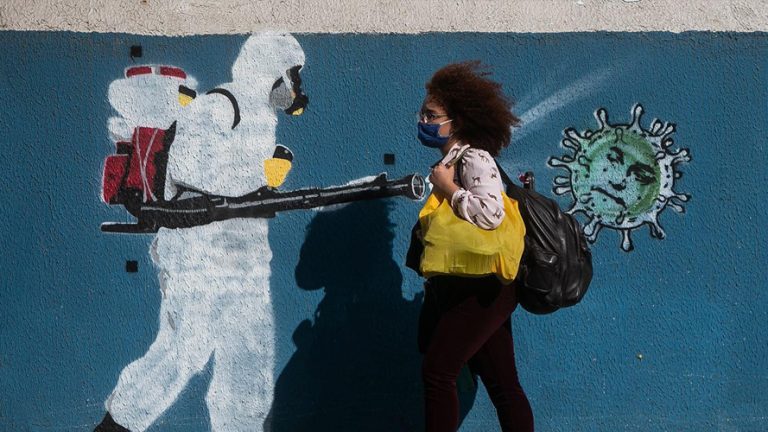This article traces emerging coronavirus risks exacerbating women’s political exclusion
The coronavirus pandemic continues to disrupt political processes around the world. Seventy-three elections have been postponed. Many parliaments have suspended or limited their activities, and over a hundred countries have restricted citizens’ freedom of assembly and expression in the name of public health. However, coronavirus risks exacerbating women’s political exclusion, and authoritarian and authoritarian-leaning leaders have further taken advantage of the emergency to concentrate power in the executive branch.
Few analyses have probed the gendered consequences of coronavirus risks exacerbating women’s political exclusion. In the media, the main narrative about gender and pandemic politics has centered on the perceived effectiveness of female politicians in responding to the crisis—including Chancellor Angela Merkel in Germany and Prime Minister Jacinda Ardern in New Zealand. Yet these positive headlines conceal a more worrisome global picture: the pandemic’s profound political and socioeconomic effects could halt or reverse advances in women’s political inclusion.
FOUR EMERGING RISKS TO WOMEN’S ELECTORAL PARTICIPATION
Across regions, women’s rights advocates and female political leaders highlight four emerging risks to women’s political inclusion as the pandemic continues.
INCREASING ECONOMIC PRECARITY AND A RETURN TO TRADITIONAL GENDER ROLES:
First, the crisis is decreasing women’s economic security and increasing their unpaid domestic and care work. Women around the world are disproportionately employed in the informal economy and jobs with fewer social protections. As a result, they have been severely affected by public health orders that have curtailed consumption and restricted mobility. In South Africa, for example, women made up two-thirds of the 3 million people who lost their jobs. A survey in Kenya indicated that more than half of working women in Kenya lost their jobs in the spring.
In addition, many women have taken on additional caregiving tasks, primarily due to disruptions in schooling and childcare. Women were already doing three times as much unpaid domestic work as men before the pandemic; this burden has increased as traditional social norms in most societies still frame caregiving as primarily women’s responsibility. In the United States, for example, women’s participation in the labor force is currently falling faster than men’s, and more than one in four women are considering slowing down their careers or leaving their jobs. A recent survey conducted in South and Southeast Asia found that women during the pandemic are more likely than men to perform the triple tasks of childcare, adult care, and domestic work, which leaves them less time for other tasks.
GREATER RELIANCE ON INFORMAL PRACTICES THAT REINFORCE MALE POLITICAL DOMINANCE:
Second, current disruptions in formal political processes due to coronavirus risks exacerbating women’s political exclusion may precipitate a shift to more informal political practices, which are often less accessible to women aspirants and other political outsiders who lack the necessary connections. Crises enable informal rules and institutions to flourish—and these tend to favor the already dominant group. Within political parties, for example, disruptions in party primaries may lead male gatekeepers to select candidates who look like themselves or who are part of their male-dominated social networks, rather than abiding by formal selection rules.
INEQUITIES IN ACCESS TO ONLINE PLATFORMS:
Third, the switch to online campaigning and voter engagement creates new challenges for female voters and candidates. Globally, women on average have less access to and familiarity with online platforms and social media tools. In places with weaker internet penetration, non-elite women, in particular, may struggle to receive information about political processes that are disseminated online.
For candidates, the shift from in-person meetings to remote campaigning benefits those with more established profiles and networks. For example, obtaining airtime on television or radio in many countries requires contacts and resources, which may not be available to female political newcomers. As observed, most of the radio and television stations here are owned by politicians. If they are competing with a man who is the owner of a radio station in the region, what are the chances of getting airtime?
While some local civil society organizations are offering training for female candidates focused on social media use and digital campaigning, not all women have the ability to participate in virtual workshops. Further, this type of training is not currently integrated into larger, donor-funded initiatives supporting women in politics.
DECREASED PUBLIC VISIBILITY OF WOMEN:
A final challenge is that in some contexts, the coronavirus risks women’s political exclusion as it had made women less publicly visible and pushed debates over women’s rights off the political agenda. As politicians around the world have shifted to crisis management mode, senior male politicians tend to dominate political debates, press briefings, and media discussions—even though women are often the ones spearheading community responses.
For example, globally, 85.2 percent of national-level COVID-19 task forces include mostly men, and 81.2 percent are headed by male leaders. In the UK, 42.5 percent of the government’s daily press briefings during the pandemic have featured an all-male lineup with no female politician or expert. The same pattern is evident in Poland. So, the prime minister, the minister of health, most experts are all men. You see, you hear, you reflect on what men are talking about.





Add comment